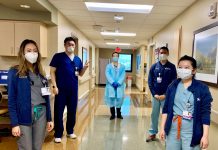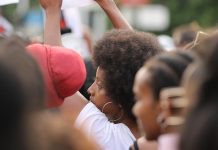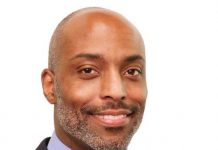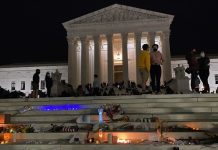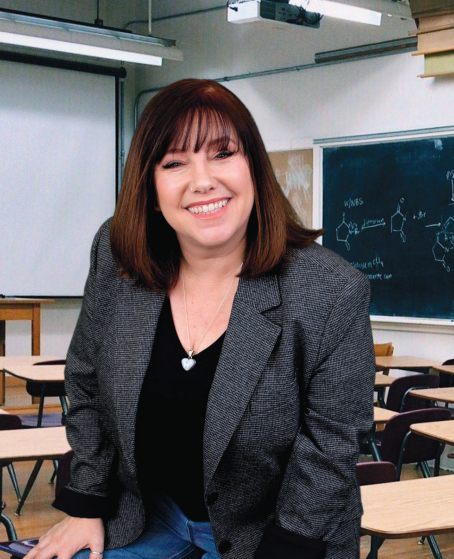Joanna Theresa knows just what it will take to open a charter school. The executive director and founding member of The Village High School of Las Vegas knows that the needs of LGBTQ+ students (and allies) can be overlooked in traditional learning environments. She knows what is at stake for these students. And, she knows they are worth it.
The educator stands steadfast and determined to meet the needs of an infinitely diverse community of perspective students and is quick to point out that The Village will complement the existing educational institutions in Las Vegas.
“We see a rising demand for curriculum and learning environments attuned to the needs of specific student populations,” she said. “The Village will be an important addition to the efforts of the dedicated educators already serving the Las Vegas Valley.”
What began as an idea, has blossomed into a tangible plan for Theresa and her team of educators and supporters. Their charge is simple: remove barriers, teach compassion and do so in a safe environment. They intend to accomplish this by creating an open, affirming community dedicated to the social, emotional and academic development of LGBTQ+ students, allies and otherwise marginalized student populations.
The Village can’t come soon enough for such students. Long-suffering and full of hormones, teenagers are no strangers to stress. Few things in life are as universal as the tinge of teen angst. “Fast Times…,” “Mean Girls,” “The Breakfast Club” ─ all revolve around the axis of an inescapable plight of puberty. It’s a time when young adults are feeling literally all the feels.
Nothing unites us like the collective cringe of the memories of adolescence. Those clothes. That hair. Decisions were made. Most of them bad. Some of them good. All of them attempts at developing an identity beyond the parental units.
Now imagine that journey in an environment that didn’t acknowledge, much less accept who you were. According to results from the 2017 GLSEN Nevada Snapshot, Nevada schools were not safe for most LGBTQ+ secondary students. Not some. Most.
The nonprofit group reported that 88 percent of LGBTQ+ students reported regularly hearing anti-LGBTQ remarks from other students.
According to the 2018 Human Rights Campaign LGBTQ Youth Report, only 27 percent of LGBTQ+ youth can definitely be themselves at school. A staggering 70 percent of students have been bullied about their sexual orientation.
This is particularly alarming when you consider where these students are in the course of brain development. According to data from National Institutes of Health (NIH), adolescence is a critical time for brain growth when significant intellectual processes are emerging. Youth are developing skills in deductive reasoning, problem solving and generalizing.
When LGBTQ+ youth should be exploring and understanding their developing abilities, they are instead subject to the risk of social and emotional stressors surrounding sexual orientation and gender identity. In addition to all the other joys of adolescence, LGBTQ+ youth learn to monitor the acceptance of their very existence.
That’s all the fuel Theresa and her team need to push the initiative forward.
“At a minimum, all children have the right to learn in a safe environment,” she said. “But the minimum is not good enough for our youth. All students have the right to learn in a safe, nurturing environment without fear of being outted, or anxiety about explaining pronouns.”
She explained the importance of building the right team of educators and staff with knowledge of working with LGBTQ+ youth. But, added the team will be expected to be proficient in all aspects of the current understanding of the gender and sexuality spectrum(s) while remaining open to future distinctions in identity. “Our team will be comprised of professionals with an advanced understanding of the current identity landscape for school-aged youth,” Theresa said. “And, we will work closely with parents, students and the community to ensure that our curriculum and policies remain relevant and beneficial for our student body.”
The Village has already hosted a pair of townhall meetings in partnership with Gender Justice Nevada. In fact, planning is underway to develop a strong parent organization and the team hopes to work with PFLAG to gather feedback and conduct a needs assessment for local youth.
“In this early phase of planning and development we are very focused on identifying the ways in which we can address the unmet needs of our student population,” Theresa said. “In some cases, this can be challenging because it requires the student to self-identify and we know that some students cannot safely do so. For this reason, our partnerships with other community-serving organizations are invaluable in helping us accurately assess the needs of our potential students.”
The proposed education model at The Village will be a hybrid of three well-established models: constructivism, service learning and the social, emotional and academic development (SEAD) model. Students will be active participants in building their knowledge through experiential learning. Educators will be encouraged to embrace differences while students will be prompted to explore self-expression. Both student and instructor are expected to be involved in the learning process.
“Expectations for teachers and students in The Village will be high,” Theresa said. “Graduates should leave us as civic-minded, compassionate and resilient citizens. Our current focus is building an academic community grounded in excellence, safety and respect.”
To deliver on this, The Village will offer a variety of services and support, including a 1:1 technology program. This has been proven to help enhance student achievement and decrease achievement gaps between socioeconomic groups and varied learning abilities.
Initial plans include a holistic approach to student well-being and development. Partnerships are in development to connect prospective students with a variety of resources, including mental health and social services. And, curriculum is slated to include materials designed to help students develop an aptitude in social awareness and stewardship.
“Students should graduate feeling connected to their world,” Theresa said. “It is our responsibility and privilege to help them become valued, respected members of the community.”
For now, Theresa and her supporters are focused on a few vital steps in their journey to opening The Village. The priority now is raising awareness for the school and securing grants and financial donations for launch. In tandem, The Village is building a case for the Nevada State Public Charter Authority that will include an assessment of population needs, financial viability, capacity and proposed learning outcomes.
Amidst the thousands of details left to be confirmed before the first bell rings, Theresa reflected on what keeps her focused.
“We are in a unique position to make a real difference in the lives of our students,” she said. “The world needs different perspectives and ideas. It makes us all better.”





